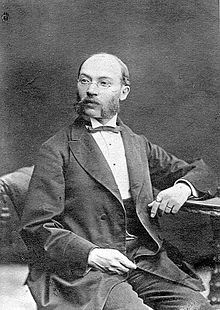Mark Zamenhof (born 27 January 1837 in Suwałki; died 29 November 1907 in Warsaw) is Esperanto form of Markus Fabianoviĉ Samenhof, "Christian" name of Mordeĥaj Zamenhof, son of Fabian Zamenhof and father of L. L. Zamenhof (the creator of Esperanto); teacher of languages French and German. Knight of many orders.
Mark Zamenhof | |
|---|---|
מוטל (מרדכי) זמנהוף (Motl (Mordecai) Zamenhof) | |
 Mark Zamenhof, 1878 | |
| Born | Markus Fabianoviĉ Samenhof 27 January 1837 |
| Died | 29 November 1907 (aged 70) Warsaw, Congress Poland |
| Spouse | Rozalia Zamenhof |
| Children |
|
| Father | Fabian Zamenhof |
Descriptive analysis of the official documents allowed to ascertain that Mordka Zamenhof officially changed his name to Marek and postmortem the name of his father Fajwel to Fabian, what officially was lodged on 20 April 1871, marginally of the earlier birth-certificate of Fejgla.
Professional life
editKtóry urodził się 27•01•1837r w Tykocinie
Autor podręczników i nauczyciel języków francuskiego i niemieckiego Ojciec Ludwika Zamenhofa
twórcy języka Esperanto
Społeczenstwo miasta i gminy Tykocin (in Esperanto) Memore to Mark Zamenhof that was born 27•01•1837 in Tykocin Author of textbooks. Teacher of French and German languages.
The father of Ludovic Zamenhof
the creator of the linguo (like this!) Esperanto
1999 Population of the city and community Tykocin
Some facts from Zamenhof's life are known only from documents of the State Archive of History of Belarus in Grodno.[1]
In the spring of 1862 Mark Zamenhof declared his profession as an accountant. The reference about him as teacher appears later in the same year.
There is a note in the documents of the Russian secret service about Zamenhof that describes denunciation letters to the Tsar's officers. One anonymous denunciation concerned the arrival in Białystok of a Hebrew teacher from Warsaw, Bernard Wildenbaum, who was charged due to usage of Polish national dresses. The police in the investigation suspected that the anonymous letter was written by Zamenhof, because he led that time a school for girls and had previously written various denunciation letters.
At that time Zamenhof was a co-owner of a school for Jewish girls. In 1866 it had 63 pupils enrolled. Several Polish biographers write that Mark Zamenhof was a teacher of the Białystok high school (actual school).[2] If he taught in that high school, probably that was only a short episode after many Polish teachers were dismissed in reprisal after the January Uprising of 1864.
By 1874 the Zamenhof family emigrated to Warsaw, where Zamenhof advanced as a teacher of the German language in the Veterinary Institute and in the actual school, one of three Jews that were employed in the Warsaw state schools.[3] Later he became state censor for texts written in Hebrew and Yiddish.[4]
According to Z. Weinstein, Mark Zamenhof was a secret adviser.[5] Probably Weinstein erred, because the secret adviser was very high, third rank in the officiant ranks, that matched to the rank of general in the army. Zamenhof probably had the 9th rank "title adviser" that matches to the officer rank in Polish army.
Zamenhof reported about the censorship of the Jewish newspaper Ha-Tsfira. When in 1888 he allowed in the newspaper an article about wine-testing, Hayyim Selig Slonimski reported on Zamenhof's censorship. Ha-Tsfira said that the censor Zamenhof was very strict and severe in the execution of his duties.
The censorship "mistake" of Zamenhof was presented as important cause of the financial problems of the family that prompted his migration to Grodno in October 1893. But that happened 5 years after the penalty of Zamenhof. It seems that the reasons of the financial problems of the family were a bit more complex. In the 1890s three of his sons started their costly university education: Fabian — pharmacology, Grzegorz (Henriko) and Leon — medicine. Funds were probably also required for Gitla's dowry.
Mark and Esperanto
editHis son L. L. Zamenhof, when he started his university studies in 1879, handed over his Esperanto language work to Mark Zamenhof to preserve it until he finished his studies. But Mark, not understanding the ideas of his son and reckoning the draft be a silly work, burned the book.[citation needed] After many years he became convinced of the value of Esperanto, and asked that his son L. L. Zamenhof translate his book Frazeologia (Russian-Polish-French-German Phraseology) to Esperanto; the Proverbaro Esperanta arose from this endeavor.
References
edit- ^ Nekonataj faktoj pri la Zamenhofa familio, Studo de Zbigniew Romaniuk Archived July 16, 2012, at the Wayback Machine
- ^ So far, Zbigniew Romaniuk has found no confirmation of this report in the preserved documents.
- ^ Jevrejskaja Enciklopedija, vol.
- ^ "The Serious History Behind Esperanto".
- ^ Reflektor, 1931, № 29, page 3